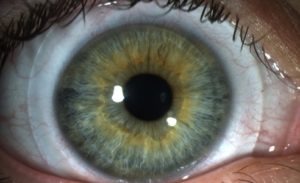Why is the Prescribing Doctor Important?
Unlike most soft disposable contact lenses, success with scleral lenses is determined by the expertise and experience of the prescribing doctor, along with the clinic’s technological and staffing resources. Scleral lens prescribing for corneal disease is non-routine and requires complex critical thinking, creative problem solving, and social intelligence.
What do Scleral Lenses Feel Like?
When prescribed appropriately, scleral lenses approach the comfort of soft disposable contact lenses. Although this sounds remarkable, it is due to the scleral lenses resting on the relatively insensitive white part of the eye while vaulting over the highly sensitive cornea. Scleral lenses hold a reservoir of non-preserved saline against the eye surface, protecting the delicate underlying tissue from drying out and rubbing against the lens. Of course, there are variable outcomes from person to person.
How Much do Scleral Lenses Cost?
The total out-of-pocket cost of professional services and a pair of scleral lenses may range from as low as a $0 co-payment with vision plans that deem the contact lenses as “medically necessary,” to under $3,000 for self-paying patients. The cost also depends on the amount of professional time needed to bring you a desirable outcome, including if treatment is required for co-existing eye conditions that may impact successful contact lens wear. Your best approach is generally to schedule an examination at ReVision Optometry, and at this initial appointment, if you qualify for scleral lenses, you will receive an estimate of out-of-pocket costs before any prescribing services begin. The services and lenses are eligible for health savings accounts (HSAs) and flexible spending accounts (FSAs).
For many, there is no price too great to regain your independence, without incurring the cost, risk, variability, and permanence of surgery. Delayed treatment can cause lost productivity, missed opportunities, and reduced quality of life. Our scleral lens patients often mention that they wish they had sought out our clinic sooner. Take the next step by scheduling your appointment at ReVision Optometry today!

